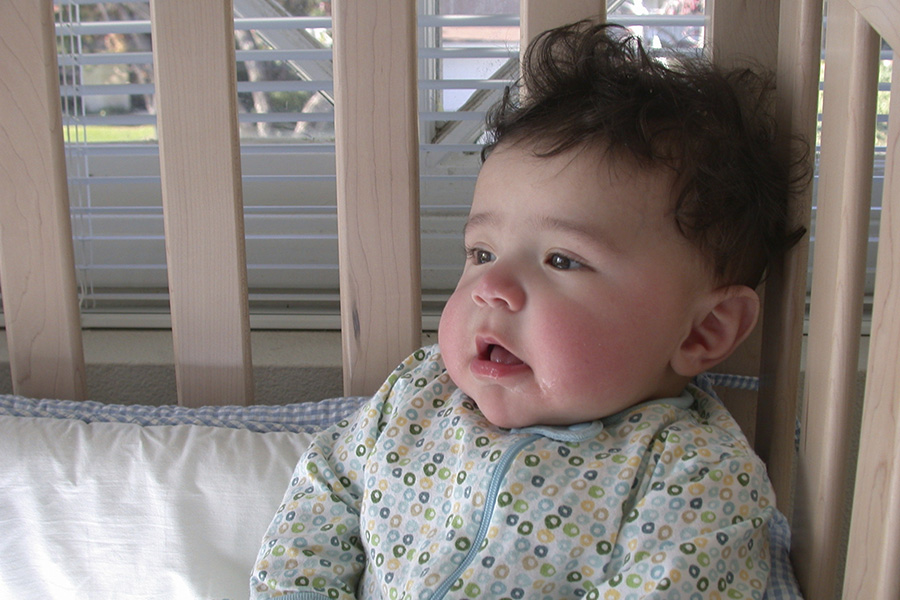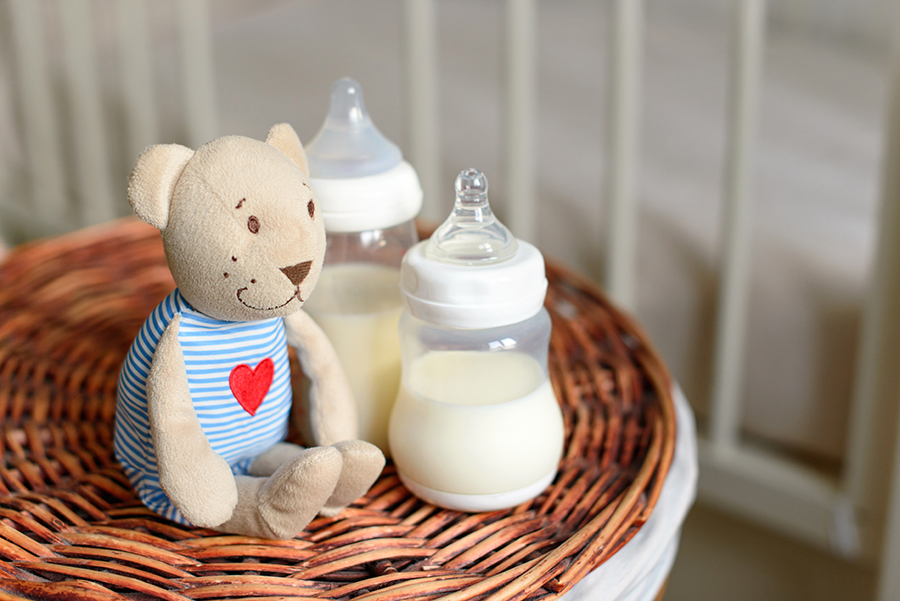Some health problems can make it harder for babies to breastfeed, however breastfeeding is often still possible. Human breast milk (HBM) contains a fine balance of immunoglobulins (antibodies), proteins, fat, and carbohydrates – a valuable combination of nutrients to nourish and protect your growing infant. Dense with nutrients and antibodies, breastmilk helps protect the newborn by decreasing risk of illnesses now and later in life. If your baby cannot initially breastfeed, you may still be able to express or pump your milk and give it to your baby with a dropper, spoon, or cup, or bottle as your baby grows.
Please note that while the goal of this article is to support parents who wish to breastfeed through a health challenge, formula-fed babies are nourished and healthy. Formula supplementation may be recommended by your child’s medical team for a variety of reasons.
Common Breastfeeding Challenges
Jaundice
Jaundice is caused by an excess of bilirubin in the blood. Bilirubin, a yellow pigment of red blood cells, is typically found in the blood but usually only in very small amounts. In the newborn period, bilirubin can build up in the intestinal tract faster than the infant’s liver can remove it. Jaundice can appear as a yellowing of the skin and eyes. Jaundice usually clears up between 2-6 weeks of age and usually is not harmful.
Some breastfed babies develop jaundice when they do not get enough nutrition, either because of breastfeeding challenges or because the mother’s milk hasn’t come in. This type of jaundice usually clears up quickly by breastfeeding more often, by supplementing with formula or donated breastmilk, or by feeding the baby expressed breastmilk after the mother’s milk comes in.
Your baby’s doctor may monitor their bilirubin level with blood tests. Some babies with more severe jaundice may need treatment with a special light (called phototherapy). This light helps break down bilirubin into a form that can be removed from the body easily. Frequent and adequate nutrition combined with phototherapy light can help the body process bilirubin and flush it from the body.
Gastroesophageal Reflux Disease (GERD)
Some babies develop gastroesophageal reflux disease (GERD). Gastroesophageal reflux (GER) happens when your stomach contents come back up into your esophagus. People of all ages have GER once in a while, and GER often happens without causing symptoms. In both adults and children, GER may cause heartburn, also called acid indigestion. In infants – babies under 12 months old – GER commonly causes regurgitation (stomach contents coming back up through the esophagus and into the throat or mouth) and spitting up.
Gastroesophageal reflux disease (GERD) is a more severe and long-lasting condition in which GER symptoms are repeated frequently; they are distressing; and they have the potential to lead to complications. GERD is more common in premature infants and infants with certain health conditions.
Some symptoms of GERD include:
- Severe spitting up or spitting up after every feeding or hours after eating
- Projectile vomiting, where the milk shoots out of the mouth
- Inconsolable crying, as if in discomfort
- Arching of the back, as if in severe pain
- Refusal to eat or pulling away from the breast during feeding
- Waking up often at night
- Slow weight gain
- Gagging or choking or having problems swallowing
Many healthy babies might have some of these symptoms and not have GERD. Also, some babies with only a few of these symptoms have a severe case of GERD. Not all babies with GERD spit up or vomit. GERD may need to be treated with medicine if the baby refuses to nurse, gains only a small amount of weight or is losing weight, or has periods of gagging or choking.
See your baby’s doctor if your baby spits up after every feeding and has any of the other symptoms listed in this section. If your baby has GERD, continue breastfeeding. Infant formula is harder to digest than breastmilk.
Prematurity or Low Birth Weight
Prematurity – or preterm birth – is when a baby is born before 37 weeks. Infants with low birth weight are those who are born with a birth weight less than 5½ pounds (2.5kg), regardless of age. Both prematurity and low birth weight can make it challenging to breastfeed, especially if the baby has to stay in the hospital for extra care. Breastmilk, when possible, helps premature babies grow and stay healthy.
Some babies can breastfeed right away, despite these challenges. This may be true if your baby was born at a low birth weight, but after 37 weeks. These babies will need more skin-to-skin contact to help keep warm. Smaller babies may also need to be fed more often because their stomachs are smaller, and they may get sleepier during those feedings.
If your baby is born prematurely and you are not able to breastfeed at first, you can:
- Hand express or pump colostrum in the hospital as soon as you are able
- Talk to the hospital staff about renting an electric pump. Call your insurance company or the local Women, Infants and Children (WIC) office to find out whether insurance will pay for rental of this type of pump. Most insurance plans must cover the cost of a breast pump, but different insurance plans will cover different types of pumps.
- Pump milk as often as you would normally breastfeed — about eight times in a 24-hour period (every 3 hours).
- Give your baby skin-to-skin contact once your baby is ready to breastfeed directly. This can be very calming and a great start to your first feeding. Be sure to work with a lactation consultant on proper latch and positioning. It may take some time for you and your baby to get into a good routine.
Colic
Colic is frequent, prolonged and intense crying or fussiness in a healthy infant. In general, colic is defined as crying for three or more hours a day, three or more days a week, for three or more weeks.Colic can be particularly frustrating for parents because the baby’s distress occurs for no apparent reason and no amount of consoling seems to bring any relief. Colic usually starts between 2 and 4 weeks of age. If there is no medical cause, colic can sometimes ease on its own by 3-4 months of age.
While the causes vary, colic is sometimes caused by infant allergy or intolerance to foods the lactating parent is consuming, such as dairy, caffeine, chocolate or nuts. Colic may also be a sign of a medical problem, such as a hernia or some type of illness.
A baby with colic may cry inconsolably or scream, extend or pull up his or her legs, and pass gas. The baby’s stomach may be enlarged. Crying can happen at any time, although it often gets worse in the early evening. If your infant shows signs of colic, talk to your doctor. Sometimes changing what you eat can help. Some infants seem to be soothed by being held, “worn” with a baby wrap or sling, rocked, or swaddled (wrapped snugly in a blanket).
For more information, visit womenshealth.gov.
Sources include:
- www.womenshealth.gov/breastfeeding/breastfeeding-challenges/breastfeeding-and-special-situations
- www.mayoclinic.org/diseases-conditions/infant-jaundice/symptoms-causes/syc-20373865
- www.mayoclinic.org/diseases-conditions/colic/symptoms-causes/syc-20371074
- www.who.int/teams/maternal-newborn-child-adolescent-health-and-ageing/newborn-health/preterm-and-low-birth-weight






















